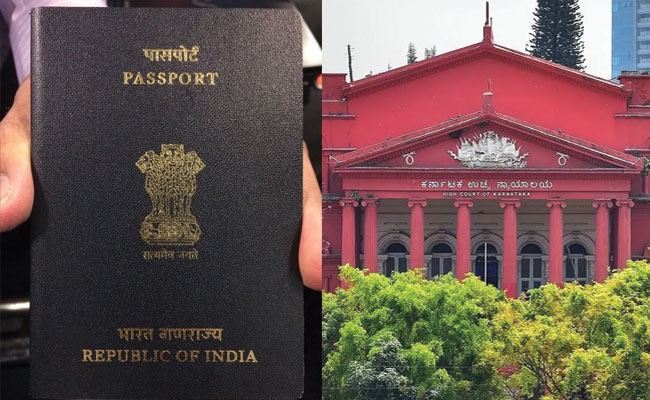Bengaluru: The High Court of Karnataka has reiterated that ”neither the police nor the criminal court invoking powers under Sections 102 or 104 of the Criminal Procedure Code can seize or impound a passport.” The court, therefore, recently quashed the order of the Debt Recovery Tribunal-1, Bengaluru, which had impounded the passport of Nitin Shambhukumar Kasliwal, a businessman from Mumbai.
The court said the Tribunal has the powers of a civil court and when the civil court itself cannot impound a passport, the DRT too cannot.
The facts of the case date back to 1999 when Kasliwal had executed an agreement in favour of various lenders for loans secured. In 2015, the lender banks initiated a case before the Debt Recovery Tribunal seeking repayment and in default attachment and sale of properties of Kasliwal and his businesses.
The banks applied for the surrender of Kasliwal’s passport. On April 16, 2015, the Tribunal passed an order retaining his passport.
Subsequently, Kasliwal filed applications whenever he needed to travel abroad and in return surrendered the passport to the Tribunal.
In December 2016 he sought the release of his passport as he had to renew it before its validity expired, but his application was rejected. He then approached the High Court.
Kasliwal’s petition was heard by Justice M Nagaprasanna, who gave his judgment on December 6, 2023.
The court noted that the Tribunal had the same powers vested in a civil court.
”The issue is, whether the Tribunal can direct withholding of passport of any person in terms of the power ascribed under the provisions quoted hereinabove. The answer would be an unequivocal and emphatic ‘NO’,” the court said in its judgment.
Reasoning that the Tribunal does not have the power to impound passports, the court said, ”The Passport Act is a special enactment and is trite that it being a special enactment which would prevail over any power of even the civil court or criminal court to retain or impound a passport.
”The issue in the case at hand is, such an act being done by the Tribunal which undoubtedly has only the power of following the procedure of a civil court in securing ends of justice. The civil court or the criminal court itself does not have the power to impound the passport.” The court said that though Sections 102 and 104 empower the police to seize and the court to impound any document, it does not include the passport.
”Impounding of any document produced before the court cannot stretch to an extent that those courts can impound the passport also,” it said.
Ordering the Tribunal to release the passport of Kasliwal, the court said, ”The very act of the Tribunal in directing surrender of the passport of a citizen or its detention before it, would amount to impounding of the passport. Such power is unavailable to the Tribunal.”
Let the Truth be known. If you read VB and like VB, please be a VB Supporter and Help us deliver the Truth to one and all.
Kozhikode (PTI): Violence erupted overnight at various places across Kerala, particularly in northern districts, following the announcement of local body election results, police said.
In Eramala in Kozhikode district, tension prevailed throughout the night after the Indira Gandhi Bhavan, a Congress office, was allegedly attacked by CPI(M) workers.
According to an FIR registered at Edachery police station, around 200 people marched towards the Congress office carrying dangerous weapons and vandalised the building, causing damage estimated at around Rs five lakh.
A statue of late prime minister Indira Gandhi was also damaged in the attack, police said. Soon after, UDF activists gathered at the spot, further aggravating the situation.
ALSO READ: Attempt to shield 'infiltrators': BJP ahead of Cong's rally against 'vote theft'
However, with the deployment of additional police personnel, the situation was brought under control, an officer said.
Police said another violent incident was reported at Marad, where stones were allegedly pelted at a UDF victory procession, leaving several persons injured.
In Sultan Bathery in Wayanad district, police registered a case after a car carrying a UDF activist and his family members was allegedly attacked by around 40 CPI(M) workers, an official said.
Sultan Bathery police also booked UDF activists in a separate incident for allegedly attacking a CPI(M) worker who objected to the bursting of crackers near his house, the officer said.
In Panoor in Kannur district, houses of several Muslim League activists were allegedly attacked by CPI(M) workers. Vehicles parked at the houses were also damaged.
According to Panoor police, the violence broke out after a UDF victory rally was allegedly stopped by CPI(M) workers armed with swords and daggers. Some UDF leaders sustained injuries in the clash.
Clashes were also reported between UDF and LDF workers at Ulikkal in Kannur district, though police intervention brought the situation under control later in the night, an officer in the Ulikkal police station said.
In Bedakom in Kasaragod district, an LDF victory march turned violent after CPI(M) activists allegedly intercepted UDF workers passing through the area. Some policemen who intervened suffered minor injuries, an officer said.
Similar violence was reported from Neyyattinkara in Thiruvananthapuram district following clashes between CPI(M) and BJP workers. Police said workers from both sides sustained minor injuries and were admitted to hospitals. Cases will be registered after formal complaints are received, police said.





